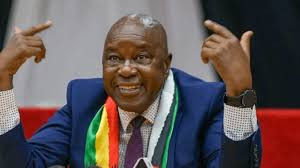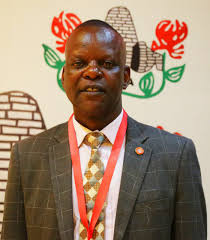FOLLOWING his appointment as bishop by Pope Francis on January 28 this year, Rudolf Nyandoro, was on April 29 ordained as the bishop of Gokwe at St Paul Primary School near Gokwe centre.
BY BENJAMIN TAKAVARASHA

Nyandoro becomes the diocese’s third bishop after Michael Dixon Bhasera and Angel Floro Martínez. His also becomes Pope Francis’ third episcopal appointment in Zimbabwe after bishops Xavier Munyongani and Paul Horan of Gweru and Mutare respectively.
Immediately prior to his episcopal ordination, Nyandoro was chancellor of Masvingo diocese. Since his ordination to the priesthood on December 19, 1998, he served as a priest at the old Gweru diocese as well as the diocese of Masvingo, Rector of St. Kizito Minor Seminary at Mukaro Mission in Gutu (2006 -2009) and Bondolfi Teachers College (2009–2016).
During his stint as the Parish Priest at St Peter and Paul Cathedral, he spearheaded the Stephen Ponde Music Project which re-recorded the songs of the revered pioneer of the country’s traditional church music, also recording some of his newer songs, and only a few years before the death of the pioneering giant. The product was adopted by the Zimbabwe Catholic Bishops Conference.
Gokwe Diocese is relatively new, erected on June 17, 1991 after it was carved out of Hwange Diocese. It is a rural diocese close to Gokwe Centre.
Keep Reading
- Chamisa under fire over US$120K donation
- Mavhunga puts DeMbare into Chibuku quarterfinals
- Pension funds bet on Cabora Bassa oilfields
- Councils defy govt fire tender directive
The majority of the flock rely on peasant farming and have to fight erratic rains in recent years. Given that the flock is predominantly Shona speaking with sizeable numbers of Ndebele and Tonga speakers.
ZCBC secretary Frederick Chiromba in his address at the episcopal ordination urged the new Bishop to prioritise learning Ndebele and Tonga at the earliest opportunity to be more inclusive towards all his flock.
Gokwe has, however, made an impact in Zimbabwean Catholicism mainly through music, in particular with its 2003 CD album titled Mbiri Kuna Mwari [Glory to God] from that year’s Music Course at the diocese, arguably one of the best since the diocesan music courses began.
That musical pedigree was all too apparent from the beautiful singing at the ordination, enhancing the prayerful ambience of the occasion
The ordination was attended by all the country’s reigning six bishops and all the four Emeritus Bishops. Attendees were drawn from across all the eight dioceses, indicative of the fact diocesan delineations are simply an administrative convenience, and as such, within the Zimbabwean context, it was indeed “one holy and apostolic” Catholic Church in tandem with apostle’s creed which the Catholic flock profess during their Sunday Mass.
The Principal Consecrator was the first Bishop of the diocese, Bhasera. The process of episcopal ordination is fairly standard across the wider Catholic world: reading of the Papal Bull, prostration of the ordainee, oath of obedience by the diocese’s priests.
But there are always things that stand out or are unique to each ordination and this one was no exception.
In a moving homily, priest Raymond Mupandasekwa drew attention to the difference between civic and ecclesiastical elevation, pointing out that the former is generally associated with power, privilege and honour, while the latter symbolises servitude.
The children made a memorable contribution to the occasion by their beautiful marching dance, the recitation of their praise and thanks poetry to the new bishops, and their beautiful singing backed by a locally improvised large piano on which they played like an orchestra.
After the ordination as the congregation mingled around in the school ground, the sense of cordiality was palpable, transcending barriers of age, social status, region and tribe, putting the lie to the divisive barriers in society at large, arguably engineered by our body politic.





